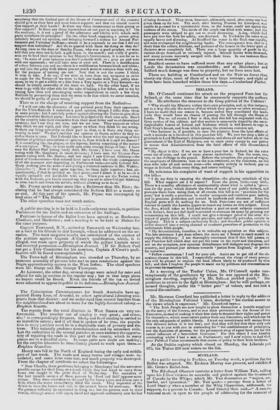IRELAND.
Mr. O'Connell continues his attack on the proposed Poor-law for Ireland, at the same time that he strenuously supports the authors of it. He attributes the measure to the Grey portion of the Cabinet ! "Why should the Ministry violate their own principles, and, in this instance, act in a way directly the reverse of that which they pursue on other occasions? I have no doubt that one reason is, because unless they conciliated the land. lords they would have no chance of passing the bill through the House of I.ords. The sec 'nil reason I fear is this, that this bill has originated with the Grey section of the cabinet, and that section is necessarily tinged by the unex. tinguishable hatred of Ireland and Irishmen which is well known to rage in Earl Grey's breast, and from which sprung the atrocious coercion act.
"Our business is, if possible, to save the ministry from the fatal effects of such a mistake as is involved in thispoor-law bill. We owe too deep a debt of
gratitude to Lord Melbourne's Administration, and above all and before all, to the government of the Earl of Mulgrave, not to exert every energy in our power to rescue that Administration from the fatal effects of this ill-considered measure.
"My object is this : if we are to have a poor-law in Ireland, let the rates come out of rents, and out of rents almost exclusively. Tax the rents, one,
two, or ten shillings in the pound. Relieve the occupiers, the payers of wages, the employers of labourers; lean on the non-residents, on the absentees, on the men who take all and restore none—who employ nobody iu Ireland, pay no wages in Ireland, drain every thing, and return nothing.'
He reiterates his complaint of want of support in his opposition to the bill-
" I do my duty in exposing the absurdities—the glaring mischiefs of this bill. What support am I to expect ? From the press, little—very little. There is a maudlin affectation of sentimentality about what is called a ' provi- sion for the poor,' which distotts the views of most of our public writers, and. prevents them from seeing that, at all events, this bill is no ' provision for the poor,' but is really a provision to render occupants and residents poor indeed, and to proclaim protection and reward to landlords and absentees. Even the English press will do nothing for us. Irish Poor-laws are not of sufficient interest to justify the London papers to insert my letters on this subject. Even the Sun, which takes so kind and zealous a part on most subjects connected with Ireland, does not feel itself warranted to consume its space by feinting my commentary on this bill. I could not give a stronger proof of the utter dis. regard of purely Irish affairs which pervades, and naturally pervades, society in England. This is a subject exclusively Irish ; and therefore public opinion is either diverted into a wrong channel or rendered powerless of protection to the unfortunate Irish people. "Sly determination, therefore, is to redouble my agitation on this subject. The less assistance I get from others, the more am I bound to exert myself to supply the deficiency. I sin thoroughly convinced that if this bill passes, or any Poor-law bill which does not put the rates on the rents and absentees, and not on the occupiers, new agrarian disturbances will disfigure and disgrace the country, and prevent ;our advance towards ' justice from England,' or justice for ourselves.
" Fellow countrymen ! I call for your aid. Assist me to get rid of the oh. noxious clauses in this bill. I respectfully entreat the clergy of every persua- sion will be pleased to explain the fatal effects likely to be produced by this bill; and then I implore the people to assist me by petitions and remonstrances to prevent its enactment."
At a meeting of the Trades' Union, Mr. O'Connell spoke con- temptuously of the gentlemen by whom he was opposed at the Bir- mingham meeting, especially "a Mr. Salt—a pickled youth." He promises to return to the fight at Birmingham : but be will perhaps, on second thoughts, prefer the "better part" of valour, and not risk a second discomfiture.


























 Previous page
Previous page